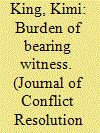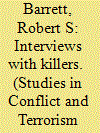|
|
|
Sort Order |
|
|
|
Items / Page
|
|
|
|
|
|
|
| Srl | Item |
| 1 |
ID:
164157


|
|
|
|
|
| Summary/Abstract |
Intersections exist regarding how institutions and individuals respond in the wake of mass violence, and we explore one theoretical perspective: resilience—the ability to overcome in the face of adversity. By controlling for the institutional context, we analyze the microlevel impact of testifying on witnesses who testify. New survey data provide information from 300 prosecution, defence, and Chambers witnesses who appeared at the International Criminal Tribunal for the Former Yugoslavia. We test propositions about resilience related to trauma, motivations, contributions to justice, fair treatment, witness fatigue, and human security. Witnesses who experienced greater trauma, who were more highly motivated, who believed they contributed to justice, and who were satisfied with their current situation were more positive about testifying. Those who believed they were treated fairly by prosecution and defence were less negative. The findings add to the debate about the burden of bearing witness in post-conflict societies and why some overcome adverse experiences related to mass violence.
|
|
|
|
|
|
|
|
|
|
|
|
|
|
|
|
| 2 |
ID:
107643


|
|
|
|
|
| Publication |
2011.
|
| Summary/Abstract |
Interviews conducted with leaders, combatants, witnesses, and victims in central Nigeria provide insight into the processes of volunteerism, recruitment, and indoctrination within armed groups. Identified are numerous avenues by which previously nonviolent citizens become willing perpetrators in deadly grass-roots conflict. Despite a commonly advertised motive for joining, narrative analyses reveal several diverse and underlying motivations. Six distinct combatant typologies are described: the Follower, the Pragmatist, the Criminal, the Soldier, the Basic Needs, and the Ideologue. The characteristics of each type, the timing of their entry into the conflict, and the implication for select intervention strategies are discussed.
|
|
|
|
|
|
|
|
|
|
|
|
|
|
|
|
|
|
|
|
|